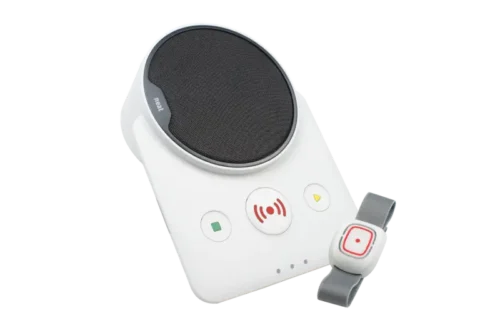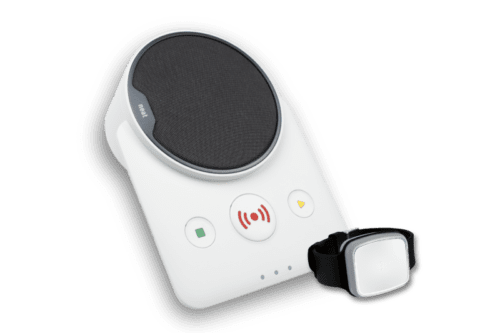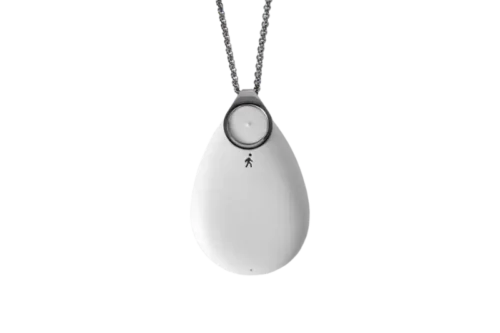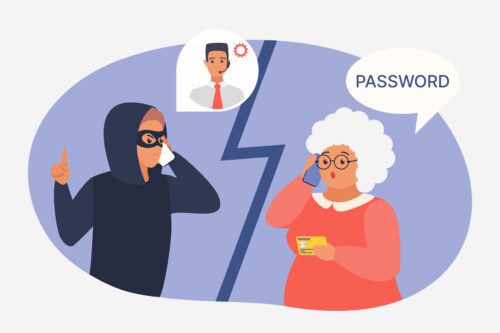
A personal alarm, also known as a medical alarm or pendant, is a small device worn around the neck or wrist that allows the user to quickly and easily call for help in case of an emergency.
This technology is becoming increasingly popular among older adults, as well as those with medical conditions that place them at risk of falling or being involved in an accident. Personal alarms provide a sense of security and give individuals the ability to maintain their independence and live in their own homes for longer.
In this article, we will discuss the top 7 benefits of having a personal alarm.
Contents
-
- Benefits of Having a Personal Alarm
- Conclusion
Benefits of Having a Personal Alarm

1. Peace of Mind
One of the most significant benefits of having a personal alarm is the peace of mind it provides for both the user and their loved ones. Knowing that help is only a button press away can be extremely reassuring in an emergency.
Those who may be confused or panic in emergencies can easily use personal alarms, as they are simple to use. The immediate connection to emergency response services gives reassurance to users and their families that assistance is on the way.
Additionally, many personal alarms offer regular check-in services that impart more reassurance to loved ones and caregivers about their well-being.
2. Independence

Another key benefit of having a personal alarm is to maintain independence. Personal alarms allow older people and those with medical conditions to continue living in their own homes rather than moving into assisted living or hiring a live-in nurse.
Personal alarms give users the freedom to move around and go about their daily activities without having anxiety about being isolated from assistance. This is specifically beneficial for those who enjoy taking walks, visiting friends and family, or running errands.
3. Quick Emergency Response
Quick emergency response is one of the top benefits of having a personal alarm. These devices are simple and easy to use, often with a single button to press to call for help. In a moment of confusion or panic, users can summon assistance quickly and easily.
When the emergency button is pressed, the personal alarm sends a signal to the monitoring center. The monitoring center is staffed by trained professionals who contact emergency services and/or designated contacts. Monitoring center dispatches the assistance immediately, without delay. This quick response time can be critical in emergency situations, where every second counts.
Moreover, some personal alarms include additional features such as fall detection, which automatically detects a fall and calls for help without the user having to press the emergency button. This is especially useful for individuals who easily become unconscious or are unable to press the button after a fall.
4. Wearability

Personal alarms are designed to be worn around the neck or wrist. This makes them portable and convenient for users to carry at all times. This “wearability” feature gives peace of mind that help is always within reach.
The portability of personal alarms means they can be worn while performing daily activities such as cooking, cleaning, and running errands. Personal alarms can also be worn when going for a walk, visiting friends and family, or traveling. Users have the freedom to go about their daily lives without feeling anxious about being too far from help during an emergency.
Furthermore, personal alarms today come in various designs and sizes. Some of them look like watches or pieces of jewelry, making them discreet and easy to wear all the time.
5. Cost-effective
In emergencies, personal alarms are an economical and wise solution that provide reassurance. Hiring a live-in nurse for in-home care can be extremely expensive. Assisted living facilities can be costly, and it can be emotionally difficult for the elderly to leave their homes.
A personal alarm system typically includes the device and the cost of monitoring services. Personal alarms are usually rented on a monthly basis, which helps keep costs low. Alternatively, paying on an annual basis can result in a lower overall cost.
Additionally, personal alarms save money on healthcare costs by preventing expensive accidents and falls.
6. Customizable
Personal alarms offer a range of customizable features that meet the specific needs and preferences of their users. These features add to the safety and peace of mind of users and their loved ones.
One example of a customizable feature is fall detection; this feature automatically detects a fall and calls for help without the user pressing the emergency button.
Another common feature is GPS tracking; this feature allows users or emergency responders to locate the user’s location. This feature is beneficial for users who become disoriented or have memory problems.
Some personal alarms come with reminder features that remind users to take medication, make a call, or perform other daily tasks. These features can be especially helpful for users who may have memory or cognitive problems.
Personal alarms are used in a variety of situations, including falls, medical emergencies, and in the event of a break-in. They are a versatile solution that can provide peace of mind and safety in a variety of different scenarios. Personal alarms can be used both inside and outside of the home, meaning that users have the freedom to go about their daily activities without worrying about being too far away from help in case of an emergency.
7. Access to Telecare Services

Access to telecare or careline services is another important benefit of having a personal alarm. Personal alarm users get access to a range of support services, which can provide an extra layer of reassurance and assistance.
Telecare services typically include regular check-ins and support from trained care teams. These check-ins can be performed by phone or through a remote monitoring system, and can include things like asking about the user’s wellbeing, reminding them to take medication, or performing other daily tasks. This can provide additional support and peace of mind for users and their loved ones, particularly for those who live alone.
Additionally, telecare services can also include remote monitoring of the user’s home, which can detect and alert emergency services in case of issues such as fire, gas leaks, or flooding.
Telecare services include support for the user’s loved ones. For example, by providing information and advice on caring for an elderly relative or helping to arrange additional support services if necessary.
Conclusion
To conclude, personal alarms are valuable and ensure the safety and security of pensioners, people with disabilities, and others who may require assistance.
Here is a quick recap of the top 7 benefits of having a personal alarm:
At Telecare24 we provide the latest personal alarm technology that is user-friendly, easy to use, and offers the best value for money. As the UK’s leading careline service provider, we are dedicated to providing our customers with the best service. We ensure that our personal alarms are always up-to-date with the latest technology. Contact us today to learn more about how a personal alarm can benefit you or your loved one.
If you found this article helpful, please share it with your friends and family. Check out our blog for additional useful information like this.









